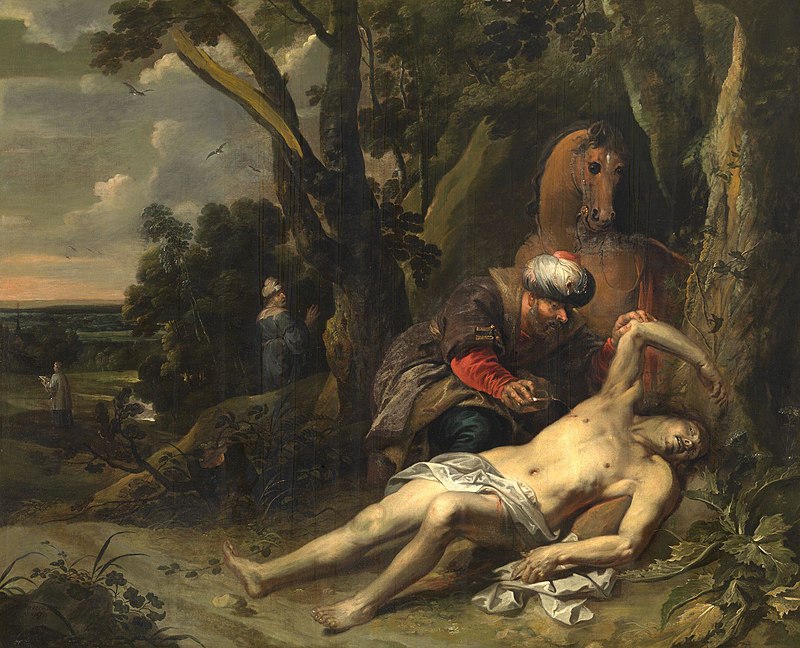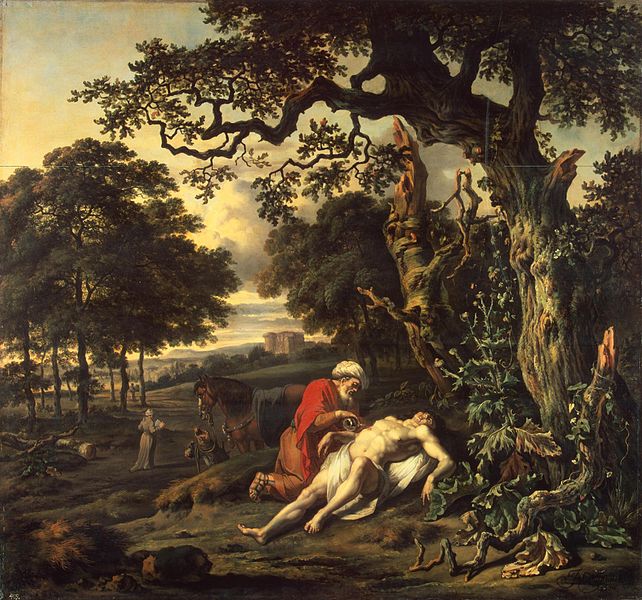Galatians 3:15-22
Pastor James Preus
Trinity Lutheran Church
August 29, 2021
How many religions do you think are in the world? A thousand? Should we number every sect and cult, which breaks away from a mainline religion? How could we possibly number them? Well, in fact, there are only two religions in the world. There is the religion of works, that is, the religion of the Law. And there is the religion of grace, that is, the religion of the Gospel of Jesus Christ. The religion of works is a false religion that teaches that a person is justified, that is, declared righteous by God and inherits eternal life by his own good works. The religion of grace is the one true religion, which teaches that a person is justified, that is, declared righteous by God and inherits eternal life as a gift through faith alone, when he believes that God forgives his sins for the sake of Christ Jesus’ suffering, death, and resurrection.
Adherents of the religion of works come in many forms. They call themselves Muslims, Jews, Buddhists, Hindus, Mormons, and even Christians. Yet, they all believe essentially the same thing when it comes to salvation. They believe that they are saved by their own good works. They think that God, or whatever power they believe in, is satisfied and will reward them for what they do in this life. In short, they trust in themselves. Adherents of the religion of grace are true Christians. They do not trust in their own good works, but rely solely on Jesus Christ and his righteousness. Christians believe that they are saved by grace, that is, as a gift from God when they believe that God forgives them for Christ’s sake.
The purpose of St. Paul’s epistle to the Galatians is to teach that a sinner is justified by grace through faith in Jesus Christ apart from works of the Law. In our Epistle lesson, St. Paul argues this point by pointing out that God gave righteousness and salvation to Abraham by a promise 430 years before he gave the Law to Moses. If God promised the inheritance as a gift to Abraham, how could he then give it under the condition of works. That would be to break his own covenant. But if not even a covenant made by men can be broken, how could God’s covenant of promise be abolished by the Law. As St. Paul says, “For if the inheritance comes by the law, it no longer comes by promise; but God gave it to Abraham by promise.”
And it is not only that God gave it to Abraham by promise, but God gave it to all people by promise. God said to Abraham, “in your offspring shall all the nations of the earth be blessed.” (Genesis 22:18) This offspring is Jesus Christ, who is descended from Abraham according to the flesh and is God most high, begotten of the Father. All nations of the earth are blessed through Jesus, because he alone has paid our debt of sin and won for us salvation. Abraham was saved through faith as well as all who believe. In fact, salvation has always been a gift from God received through faith in the promised Christ. Immediately after Adam and Eve sinned, God promised salvation through the offspring of the woman, when he spoke to Satan, “I will put enmity between you and the woman, and between your offspring and her offspring; he shall bruise your head, and you shall bruise his heel.” (Genesis 3:15) So it is abundantly clear from Scripture that no human being is justified before God by works of the Law, but all are saved through faith in Christ alone.
Why then the Law? If the false religion is a religion that teaches salvation by works of the Law, was God adding something bad when he gave Moses the Law? Or as St. Paul asks, “Is the law then contrary to the promises of God?” He answers, “Certainly not! For if a law had been given that could give life, then righteousness would indeed be by the law.” God did not give us the Law so that we could gain life by obeying its commands. God added the Law because of transgressions, that is, because we were sinners! If we were sinners even before the Law, how is the Law going to make us righteous? It’s not! But it will certainly show us our sin. It will teach us what is righteous and what is not; what is good and what is evil. And when we look at the Law, we will recognize that our works are but filthy rags, and we need to be saved from our sin. That is why God gives us the Law.
The reason the Law cannot make you righteous or give you life is because it can only tell you what to do, but it can give you no power to do it. That does not make the Law bad. The Law is good. The Law expresses God’s eternal will. If you actually did what the Law commanded, you would indeed be righteous and have eternal life. But if you do not do what the Law commands, then you are under a curse, as it is written, “Cursed be everyone who does not abide by all things written in the Book of the Law, and do them.” (Galatians 3:10; Deut. 27:26). Our problem is that we do not actually do what the Law commands.
Take the lawyer from our Gospel text, who asked Jesus what he should do to inherit eternal life. Since he asked what he must do, Jesus asked him what the Law says. The Law tells you what to do. He answered correctly, “You shall love the Lord your God with all your heart and with all your soul and with all your strength and with all your mind, and your neighbor as yourself.” Jesus told him, “You have answered correctly; do this, and you will live.” And Jesus is right! If you would love God with all your heart, soul, strength, and mind and your neighbor as yourself, you would have a wonderful life. Your anxiety would go away. You would be content with what you have. You wouldn’t fight with those you love. In fact, you would learn to love even your enemies. And if you did this perfectly, you would live forever.
But do you? Do you love God with all your heart, soul, strength, and mind? The Law commanded that the Jews give ten percent of their income to the Lord to provide for the Levites. Ten percent or a tithe is still the standard amount Christians are encouraged to give to the church. Yet, you’ll notice these words don’t even mention money. It mentions your heart, soul, strength, and mind. And to love God with not ten percent of these, but all of them. Do you do this? The simplest way to show God that he is your God is to go to church. I once read a motivational poster that said that a one-hour workout is only four percent of your day. Well, if you do the math, you’ll find that going to church then works out to less than one percent of your week. Yet, still people find other things to do instead of coming to hear the Word of God, learning from him, praying and praising him. If we each exercised an hour a day, we’d be quite fit. Yet, how many of us take even a quarter of an hour to read Scripture and pray each day. We work hard for our children. We want them to do the sports they like, to get good grades, to get a good job. But do we exert our strength to teach them to be Christians and to hold God above all else? No one wants to be considered dumb. We take pride in the power of our minds. Yet, do you seek to learn from God? Do you love God with all your heart, soul, strength, and mind?
Do you love your neighbor as yourself? Do you honestly do unto others as you would have them do unto you? Do you think of them as you would have them think of you? Do you speak about them as you would have them speak about you? Here is why the lawyer seeking to justify himself asked who his neighbor was, prompting Jesus to tell the well-known story of the Good Samaritan. The Lawyer seeks to lighten the burden of the Law, but Jesus’ story does no such thing for an adherent to the religion of works.
Depending on whether you are an adherent to the false religion of works or the true religion of grace will determine much how you look at the story of the Good Samaritan. If you, like the lawyer, are an adherent to the religion of works, the Good Samaritan is a devastating blow. Samaritans were hated by the Jews. The Samaritan had no reason to believe that if he were in the same situation that that man would have helped him. But despite that, the Samaritan helped his enemy. He took the injured man’s burden, treated his wounds, and laid him on his own animal and brought him to safety. He paid the innkeeper two denarii, which is two days wages, and then he offered to pay back whatever more it cost to care for him. That would be like you handing a hospital your credit card to care for a complete stranger. No one can live up to this standard. “Go and do likewise,” Jesus says? How? Here we see that the Law is not accomplished by outward show, but in that word that must begin from the heart: Love. The law commands what commands cannot bring, that you love your neighbor from the heart. The Law is good, because it reveals how we should be. We should be like Jesus. Jesus is the Good Samaritan. But when Jesus is a mere lawgiver, just an example to follow, he is terrifying.
Yet, if you are an adherent to the religion of grace, then you recognize the Good Samaritan as your Savior Jesus, who rescues you from your sin and pays for your redemption. Through this story, you recognize what St. Paul means when he says, “Scripture imprisoned everything under sin, so that the promise by faith in Jesus Christ might be given to those who believe.” By speaking the truth, Scripture exposes you as the beat-up man, half-dead, lying on the side of the road. You have been beaten up and robbed by Satan and your own sinful flesh. You cannot help yourself. The Law doesn’t help you. The priest and the Levite simply walk past. All they can say to you is to get up and be alive. Stop being a sinner! Yet, your Good Samaritan comes, Jesus Christ, with his preaching. He pours wine, which stings, that is, he preaches the Law to you, so that you know you need him. Yet, he pours on soothing oil as well, medicine for your sin-sick soul. He forgives your sins. He bears your burden. He paid for your sins on the cross. And his death fully atones for you. He says, “Whatever more is spent, I will pay it back.” That is to say, as many sins as you have, he forgives them in full.
It is after you have been justified by faith that you can then follow the example of the Good Samaritan, walking by the Spirit. This cannot be done under compulsion, or you will be terrified and it will never be done. But when you have been loved by your Good Samaritan, when you have received the promised blessing through faith in Christ, the Offspring of Abraham, then you will follow with a willing heart. Having loved, you will love without fear of judgment. The Law demands love. It is Jesus, our Good Samaritan, who has perfected love for us. And having received his love through faith, we too will live in love, imperfectly now, but perfectly in eternity. Amen.





 RSS Feed
RSS Feed